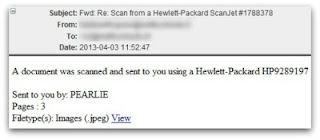When you click on the file, you find that it isn't a scanned copy of the latest office report. It’s really a link to a third-party website that will download a virus to your computer. These viruses phish for personal and banking information on your machine.
 The settings in the email header have been faked, so the messages appear to come from an internal email address. However, with so many workplaces failing to set strong passwords, it is possible that your scanner was hacked.
The settings in the email header have been faked, so the messages appear to come from an internal email address. However, with so many workplaces failing to set strong passwords, it is possible that your scanner was hacked.As always, variations of the scam exist. Most recently, scammers have disguised malware as emails from Hewlett-Packer and Xerox scanners. But scammers will hijack any famous manufacturer’s name to lend credibility to their scam.
NOTE: Hewlett-Packard, IBM and Microsoft are BBB Accredited Businesses. Hewlett-Packard is also a BBB National Partner.
How Do I Protect My Work Computer From Viruses:
While your work computer is not your personal property, downloading a virus is great way to ruin your work day. Here are tips for protecting your office computer:
- Create strong passwords. Don’t leave the factory presets or use easy to crack passwords. See Microsoft’s tips for creating strong passwords.
- Don’t believe what you see. Scammers can make emails appear to come from an account at your office. Just because it’s an “@yourbusiness.com” address does not mean it’s safe.
- Be wary of unexpected emails that contain links or attachments. Do not click on the links or open the files.
- Beware of pop-ups. Some pop-ups are designed to look like they’ve originated from your computer. If you see a pop-up that looks like an anti-virus software but warns of a problem that needs to be fixed with an extreme level of urgency, it may be a scam.
- Keep anti-spyware, anti-virus and anti-spam software up to date. Your office’s IT department probably has your computer programmed to conduct regular scans and updates. Let these run as planned.
Have you received an email like this?
No comments:
Post a Comment